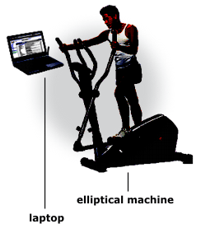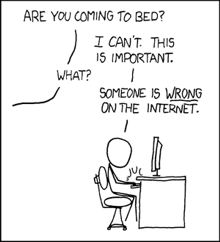Friday, May 9, 2008
Tips For Dealing With Information Overload
I sent a couple of people the following question: “What are your top tips for dealing with information overflow?” Here are some of their answers (with formatting partly adjusted, omissions within quotes indicated with dots). Please add your own tips and approaches in the comments.
Niniane Wang, Google: «I like the time-honored tradition of responding to emails or archiving them as soon as I read them. (Like this one.) I’ve also found it helpful to maintain a to-do list that I reference every hour. Everything goes on the list or in my calendar, so that I don’t have to remember it.»
Paul Buchheit, FriendFeed (formerly Google): «Drop packets. Systems that work have some kind of flow-control. . . . It’s basically one of the big flaws in email – people expect reply. One of the nice things about FriendFeed is that you are free to ignore it when you get too busy or fall behind.»
Kevin Fox, FriendFeed (formerly Google, Yahoo): «Honestly my method isn’t highly structured. I have several streams of data of varying signal:noise and rates (twitter, FriendFeed, Google Reader, email, voicemail, etc.). My strategy is to make sure I see at least the title of everything, and then pluck the important stuff out of the stream, either replying to it immediately or marking it in some way so I can ’get back to it’.
In reality “get back to it” usually means “recognize that it was important when it comes around again a second time”. This is usually most relevant with stars in Gmail. When something is both starred and unread it means that I indicated that it was important, and it’s come back for more. That’s usually my highest priority.
Beyond that, it’s mostly about realizing that communication is falut-tolerant, and recognizing the rare cases where it’s not: where it’s important and you’ll only get one notice, and where if you don’t act on it immediately you never will. This is pretty rare.»
Jeremy Zawodny, Yahoo: «I try to prioritize . . . and watch Inbox Zero every couple of months to get re-inspired.»
Inbox Zero, a tech talk by Merlin Mann given at Google.
Andy Baio, Waxy.org: «In Google Reader, I separate feeds into “mustread,” “maybe,” and “everything else” piles with tags, so that I make sure I don’t miss my essential reads. For everything else, I just liberally ignore and/or delete. More a defense mechanism than “dealing with information overflow."»
Noam Chomsky, MIT: «I wish I could answer sensibly. I just can’t. You should see the room in which I’m working. Piles of books, clippings, manuscripts, notes,... All sorts of lost treasures buried in them.»
Louis Gray, LouisGray.com: «The big tip is to be selective in what you consume. I don’t write about everything, so if, for example, I do get e-mail pitches that aren’t in my areas of interest, it can be clear right away. Similarly, while it can be popular to sign up to every RSS feed under the sun, it makes sense to only select the very best ones that repeatedly have good content.
Also, reading fast, clicking fast, and having a quick yea/nay trigger can make things much more manageable. I do read upwards of 500-800 articles a day on Google Reader. Criteria that impacts just what I’ll read more thoroughly or respond to includes the headlines, the source, and whether it’s new data or more rehashing that’s already been covered somewhere else.
Taking on the information overflow means doing so in approachable chunks. I read e-mail, feeds, Twitter and FriendFeed first thing in the morning, just after feeding the dog. :-) Hitting each spot every few hours throughout the day means that work doesn’t pile up. It’s also just as important to get all the items to zero before going to bed, so there are no loose ends.»

Matt Cutts, Google: «At the beginning of the day, write down the 1-2 things you really want to accomplish that day. That will help keep you on track.
I’ve started exercising in the morning and I do email while I
exercise. That lets me clean out my inbox early in the morning.
In Gmail I write a reply to some emails, but then save them as
drafts and let them sit for a few hours or more. That prevents me from getting into a vicious loop of email back-and-forth.
Empty out your inbox by selecting all your email and (say) making
those emails starred – then archive that email. Once your inbox is
empty, it’s much more motivating to keep it empty.
Sort your RSS feeds by priority into folders, and hit the most
important folder first.
Use a tool like FeedRinse to subtract recurring RSS items that you
know you aren’t interested in for a given feed.»
Steven Hodson, WinExtra.com: «When it comes to RSS I tend to do two things. When I start my morning read I will skim over the posts. If they are only partial posts they usually get passed over as I don’t want to waste time by having to go the site to read the item. Same thing to those sites like CNN and Wired who only publish headlines they get ignored as well. As well I am a lot more selective in what I will finally end up reading during that first run through in the morning – if I get the sense by looking at the first few lines that this isn’t something that I would normally write something about two things can happen. I’ll either totally skip it or I’ll save it to one of my predefined Clippins folders in FeedDemon.
For the rest of the day I do something similar when the feeds get refreshed. That being short posts are generally read in full and longer posts recieve the same treatment as above. In both cases once I have gone through the feeds that have arrived I will go through the ones that were saved to the clippings folder.
Email is a little different in that I really don’t get that much right now (but I am seeing that change slowly) but notification from FriendFeed and the such get left most of the time until I have a bunch to do all at once. Personal emails are usually held until I have a quiet moment so that I can concentrate on them. Pitches are fairly easy – I give them a quick glance and any that are of the stupid type or boilerplate crap get tossed. Other ones that catch my interest are tagged to deal with at a later point in the day.»
«Triage (pronounced /ˈtriːɑːʒ/) is a process of prioritizing patients based on the severity of their condition so as to treat as many as possible when resources are insufficient for all to be treated immediately. The term comes from the French verb trier, meaning “to sort, sift or select.”»
- Wikipedia
Elinor Mills, CNet: «Triage. I scan email and see what needs immediate attention, set aside things that can wait and then go back to them in order of importance, hoping that none of them expires in the meantime. ;) I scan the RSS and iGoogle headlines several times a day. It is overwhelming the amount of information that gets thrust at you every day all day, especially in the daily news business. I also make a lot of lists of ideas to pursue and stories I’m working on to try to stay on top of it.»
Shelley Powers, Burningbird.net: «Frankly, the people who are having problems with information overflow are people who want the information overflow. We’re all big boys and girls here. We don’t need specialized technology or social gurus to tell us when we’ve subscribed to too many feeds, or are on too many social networks. We don’t need calendaring software to tell us when we’ve taken on more work than we can handle. What we need to do is prioritize the demands on our attention, and when we find ourselves overwhelmed, lop off the bottom distractions.
In all honesty, people who talk about how “noisy” their lives are one moment, while extolling the virtues of Twitter for FriendFeed the next would be the first distractions to go, and easily. Other distractions may be more difficult to drop, but if we want to be known for something other than “she gave great Twitter”, we have to make the decision, and live with the loss.»
Seth Finkelstein, Infothought blog: «Unfortunately, I don’t think I’m very good at dealing with information overload. If I were better, I think I’d get much more done. This cartoon has already become a classic . . .

I think mail-sorting is important. I like text-based command-line tools, since they are FAST – the waiting time to try to move rapidly through web-based GUI interfaces irritates me.»
Tony Ruscoe, Google Blogoscoped: «[B]y reducing the amount of information. So, for FriendFeed, I originally subscribed to quite a lot of people. Once they introduced the “friend of friend" type of sharing, I couldn’t handle the amount of information so I started pruning my subscriptions (since FriendFeed doesn’t have the option to just block “friends of friends”).
My lifesaver with regards to feeds is Google Reader. I add a tag/label/folder for every single feed to which I subscribe. That way, I can prioritise my reading effectively. When I’m using Google Reader for Mobile, I’m a lot more ruthless as to which posts I mark as read without even reading them. When I’m in the standard browser version, I use the “expanded view” rather than the “list view” but very quickly skim read posts, continuously pressing j or k to move back and forth between them. Quite often, if I’m pushed for time, I’ll simply star an item after skim-reading it and read it properly later when I have more time – particularly if I’m using Google Reader for Mobile.»
Dave Winer, Scripting.com: «I don’t know – I don’t have information overload. I keep wanting more. More! I want more! :-)»
[Thanks all! Xkcd cartoon Creative Commons-licensed by Randall Munroe. More on Triage at the Wikipedia source. Image with workout machine compiled via HealthPhenoms.com and Loaz.com.]
>> More posts
Advertisement
This site unofficially covers Google™ and more with some rights reserved. Join our forum!
